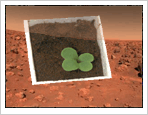Galactic Garden Virtual
Laboratory

PIs: Norm Lownds, Carrie Heeter
In Spring, 2002, we worked with 69 sixth graders
and one third grade class to conduct prototypical plant growth experiments
using simulated Mars dirt collected by Johnson Space Center and
given to us by NASA scientist Chris McKay at NASA Ames.. NASA's
goal is to learn the minimum requirements to grow a plant on Mars.
In addition, the participating classes learned about the process
of scientific experiments in a fun, meaningful context while conducting
real research. Here is the Mars
Experiments Garden web site used by the schools.
Here
is the report from our spring classroom experiments. They have
helped us clarify plans for a Galactic Garden project, for which
we are now seeking funding.
We seek to construct a virtual national galactic
garden laboratory through which K-12 schools would propose and conduct
plant research in support of NASA's need to grow plants to feed
astronauts in space. The virtual laboratory would provide rich,
age appropriate, fun, inspiring, educational resources to inform
and motivate kids and teachers and to support them in their research.
The virtual laboratory would connect teachers with MSU and NASA
to guide their research planning, support their classroom research,
gather and share data, and publish the findings. We would develop
scientific visualizations of the data and simulations of the process
of science research and of basic biological plant and human-plant
processes. The virtual laboratory would provide a communication
channel between participating classrooms and plant scientists at
MSU and NASA. Parallel and related research in the Mars Experiments
Garden at the MSU Children's Garden would be viewable by webcam.
Robotics would maintain the virtual space station garden.
We would maintain three parallel interfaces which
share much of the same content, look and feel -- one for kids, one
for teachers, and one for NASA scientists. The “above the
fold” interface would be the same for kids, teachers, and
NASA scientists – it would be the kid interface (described
below). Below the fold, if you scroll down, the teacher site would
have teacher explanations, lesson plans, ties to national and state
standards, and information about proposing experiments, a discussion
board for talking with Plant Scientists and with each other about
curriculum and data collection and other questions. The NASA scientist
site below the fold would include a place that lists the current
chat questions from teachers and kids waiting for answers. There
would be a way to add News Bulletins, and a place to review proposals
and to communicate with MSU to post new RFPs. A scientist's view
of the results would be available.
There would probably be a special room for each
registered class in the kids and perhaps teacher interfaces.
The kids page main menu would be based on an intriguing
scene of plants, science, and space, somewhat like the microbe zoo
main page.
We would have fun characters representing lab
rat plants (with a funny white red with red eyes peeking out from
behind the plant), a cactus with eyes and a mouth representing the
extreme environments plant, and a funny tomato on a tomato plant
with eyes and a mouth representing food plants.
There would be a space station in the sky with
plant science going on. Mars would be in the sky with plant research
going on and astronauts eating carrots.
Kid scientists in lab coats would be conducting
the plant science. Test tubes with colored bubbling liquids, pressure
domes, and atmosphere readouts would add atmosphere and fun.
There would be a copy of the Journal of Classroom
Galactic Garden Science as an interface to the research already
conducted for this project.
There would be a bank of computers to do searches
on different topics as kids do research on a topic.
Each small area would be a link to that main content
area.
Live weekly bulletins from NASA would scroll across
the bottom of the screen, clickable for more detail.
We could tie in with Space Camp by having
Space Camp Galactic Garden module they do while at SC, then can
follow up on when they return to the classroom. Links the the pages
might link to an explanation of the Space Camp galactic garden module.
|

